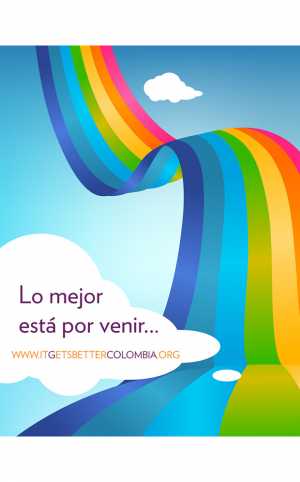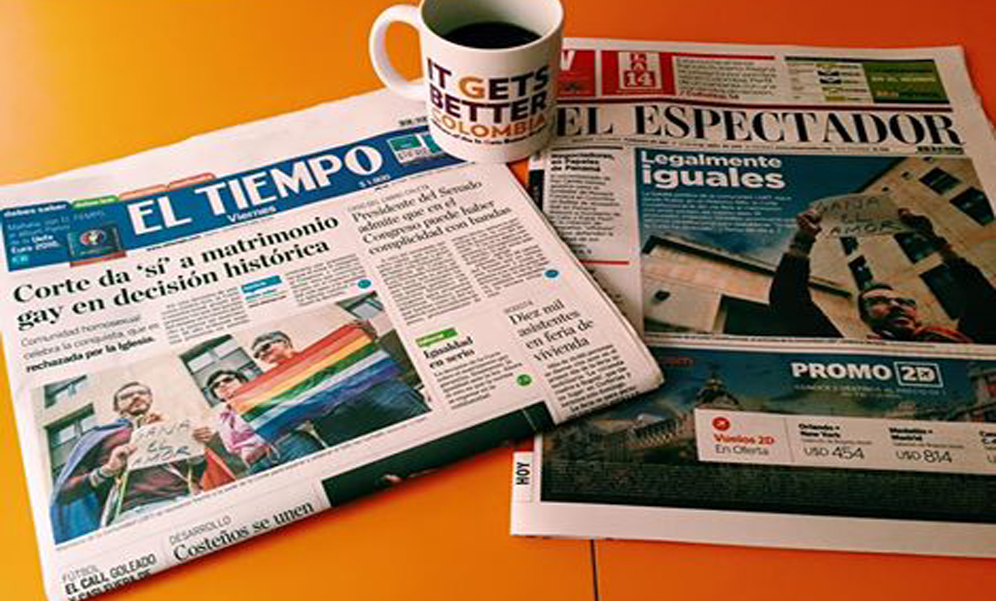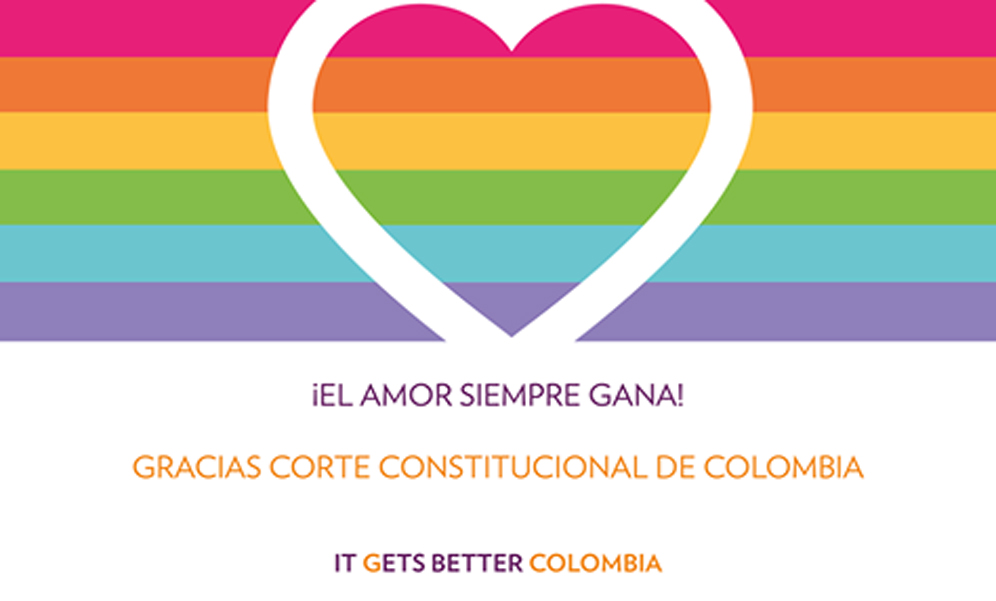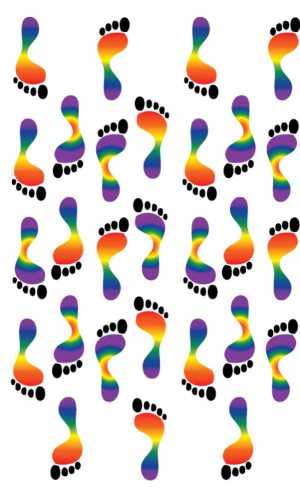In several countries around the world, including Colombia, both children, young people, and grown-ups suffer constant forms of aggression and discrimination because of their sexual orientation or because they have a different gender identity.
Unfortunately, violence against the LGBTI community is pressing. Excruciatingly, there are hundreds of people in Colombia (and the world ) who face death, physical and verbal violence, and a number of threats, that come from civil society and the state.
It Gets Better Project™
In 2010, It Gets Better Project™ was founded in the United States.
The idea was to send a support message to all members of the LGBTI community telling them that everything improves, everything can get better. At the moment ” It Gets Better” has expanded to 15 countries, six in Latin America, seven in Europe and two in Oceania.
The process of coming out of the closet, with yourself and others, is a path that in many cases, not to say all of them, is painful and lonesome.
It Gets Better Project ™ has become a global movement inspiring more than 60,000 people to create their own videos giving a message of support.

Given the statements above, the foundation It Gets Better Colombia, was created to support anyone who is the victim of homophobic bullying. For this foundation, equality is a right, an obligation, and a necessity all people have. The message they want to spread in every corner of Colombia is that: It can get better!
Solkes: Why did you decide to be part of an initiative such as this one?
Daniela Villegas, IGBC communications and marketing director: The It Gets Better Project has had a huge impact amongst youths in the USA given that their message of support reached everyone, from the neighbor next door to people like Barack Obama or celebrities. They have made people feel something; that they aren’t alone, that others have gone through the same things, that you will be supported, and that at the end of it all, it always gets better for each person. I think that this last part was the biggest push for this initiative in Colombia and people had such a drive to make our society more inclusive and equalitarian.
And, it should be noted that since the decree 100 of 1980, “theoretically” homosexual acts are not prohibited by law in Colombia. However, whenever a homosexual couple displays affection in public, they are faced with attitudes of rejection. This is not normal at all!
The fight for a dream
The mission of It Gets Better Colombia is simple: fight to create a country free of prejudice for the LGBTI population; to endorse and inspire respect in social, economic, political, and cultural fields.
There is a phrase we heard once from a person who happens to be very close to us and is super religious “God doesn’t exclude anyone from his love” and he said like that, with no strings attached but also hinting that you are supposed to be attracted to someone of the opposite sex.
Therefore, they consider it of great importance that all educational institutions should develop and work constantly on subjects such as acceptance, tolerance, and respect for people of diverse sexuality.
It is also essential that people who feel abused receive the necessary counseling. And last but not least, to be a part of positive changes that develop through digital platforms with messages of support and hope for all LGBTI population.

Solkes: What are your objectives in an immediate, medium, and long-term scenario?
In many opportunities homosexuality is seen as a contagious disease or they think that they have to be “cured” by a shrink. That they need to be sent to a religious institution so that “they can get over it”.
Lina Bravo, ICBG’s psychological director in the education and clinical department: The fundamental objective is to give support through stories and messages that may have an impact on the LGBT+ community. In the short term, we want to keep growing in all social networks in order to reach more young people and o be heard everywhere. Our mid and long-term plans consist of opening an office that gives psychological help that will help us support young LGBT+ people and their families. Furthermore, we have an educational area where we strive to reach educational institutions and prepare children and staff members to have respectful behavior towards their LGBT+ schoolmates. Lastly, and maybe this is the objective that is more into the future, we would like to have means for a magazine and an online radio program.
Solkes: Do you consider that in a country such as Colombia, where religion has such an important role, people’s behaviors are influenced regarding this subject?
Lina Bravo, ICBG’s psychological director in the education and clinical department: Absolutely, Colombia is a country where religion sets the tone for certain trains of thought and actions. Due to this, there are lots of people that because of their spirituality set discriminatory rules for everything that doesn’t comply with their religious texts.
The path to change
Open-mindedness in Colombia is taking place. It has not been an easy path or something that has happened overnight. Examples are:
In 1991 the new constitution includes a number of provisions of particular interest to the LGBTI community, such as the right to equality, the constitutional principle of pluralism and the right to free development of personality.
In 2000 the Congress establishes in the Penal Code a norm that aggravates it when it is verified that the crime was motivated by the sexual orientation of the victim.

In 2007 a bill was passed in Congress that sought to recognize the property rights of same-sex couples. On 4 October 2007, the Constitutional Court ruled that same-sex couples in Colombia with a minimum of two years of coexistence, in fact, may join together the social security system.
Since November 4, 2015 the Constitutional Court cleared the way for the adoption of homosexual couples.
Although steps have been taken to respect the community members in Colombia LGBTI still has many things to do.
Solkes: What do we need to do in Colombia?
Lina Bravo, ICBG’s psychological director in the education and clinical department: If we could all understand that our differences don’t have to be barriers but instead places to learn maybe all prejudice will be erased.
Solkes: Have you seen changes in Colombian society in regards to the LGBT community?
Daniela Villegas, IGBC communications and marketing director: Absolutely, we believe and see that things start positively shifting; subjects such as equal marriage and adoption by homosexual couples in Colombia are proof of it.
Ignorance is crucial. People are afraid of the unknown, they assume positions from that stand point and immediately reject others based on that.
Solkes: In your experience, do you think it can get better?

Daniela Villegas, IGBC communications and marketing director: Things take time; some people take longer than others but situations almost always change for the better.
Solkes: If someone who is reading this needs help, what would you tell them?
Lina Bravo, ICBG’s psychological director in the education and clinical department: First of all, that they are not alone, there are lots of people who are going through a similar situation and in the end, things get better. There are very hard moments, filled with uncertainty but something rewarding in life is to be yourself, with love and courage you can achieve anything. Besides that, in It Gets Better Colombia they can find a friend that is willing to help them. We are here to listen, to be a helping hand, and to support anyone who needs it.
A concrete example is that despite the recognition that members of the LGBTI community are having in the political arena, the candidates claim that being chosen is very difficult. In the same way, same-sex couples no longer have to perform a tricky procedure to register their children.
Head up high
Needless to say, the facts, figures of abuse, and violence against LGBTI people are shocking, to say the least. In total, from 2006 to 2014, there have been 824 killings of LGBTI people in Colombia. Between 2013 and 2014, 222 cases of abuse were recorded by the police towards the LGBTI community.
Writing and reading these figures will never be equivalent to facing these problems. This is our grain of sand towards this cause.

We ask ourselves: What is the cause of the violence perpetrated against LGBTI people? In our humble opinion: ignorance and prejudice. This shows that the fight is meant not only to achieve legal steps but also in our day-to-day lives. No one should have to suffer as a cause of the ignorance and prejudice of cowards.


